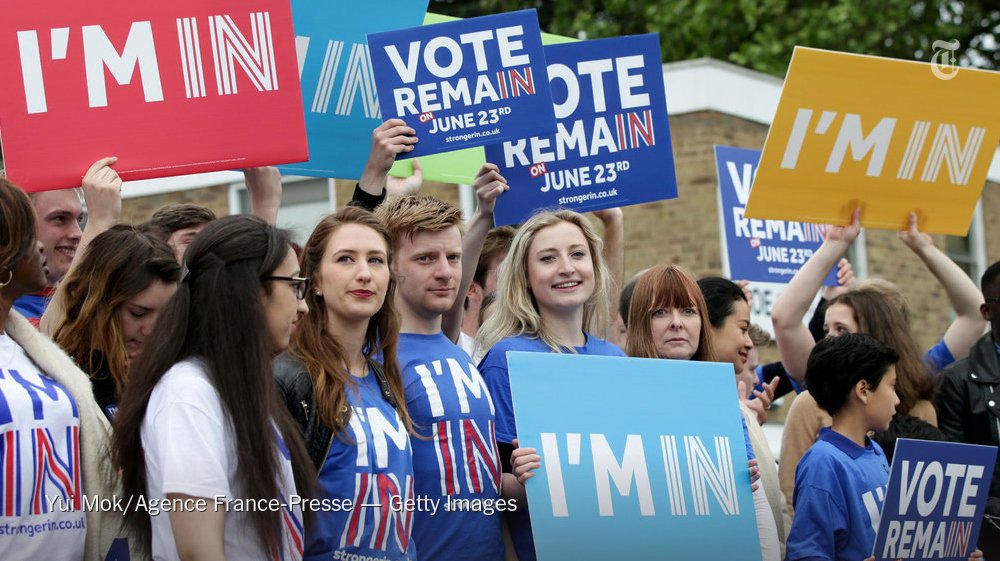London-On June 23, tens of thousands of young Britons will be gathered at the Glastonbury music festival, whose headliners include Coldplay, Muse and Adele.
Others will be avidly following the European Soccer Championship in France or biting their nails in anticipation of the next episode of hit teenage soap “Hollyoaks.”
In addition to that, there is the referendum that day asking them whether Britain should leave the European Union.
“Wait, are we even registered to vote?” Priya Patel, 25, asked her friend recently, as they waited outside a theater in east London to see their favorite stars arrive at the British Soap Awards.
Would she want Britain to stay in the European Union?
“Oh, definitely,” Ms. Patel, a medical practitioner, answered impatiently, switching her attention to her smartphone, visibly more interested in televised dramas than in the long-running tensions between her country and Brussels.
Holding the attention of young voters -and getting them to turn out on June 23- is one of the biggest challenges for both sides in the campaign over Britain’s place in Europe, especially for the advocates of remaining in the European Union.
Polling suggests that younger people are more favorable to continued British membership in the bloc than are older voters and in a close race could decide the outcome.
In this case, some analysts say, it could be particularly hard to motivate them, not only because many of them will be immersed in summer activities but also because they are being asked to embrace the status quo rather than to take up an idealistic cause of change of the type that typically energizes young people.
“It’s hard to get them passionate about remaining,” said Scott Townsin, 26, who recently directed a campaign video urging young people to vote in favor of staying in the European Union.
On the other hand, older voters tend to decide based on information they get from traditional media.
However with young people, Mr. Townsin said, “you’ve got to be loud, you’ve got to compete with brands, favorite friends, Instagram, whatever, to get their attention.”
Zak Reynolds, 20, from London, said he had yet to make up his mind. One of his parents will vote to stay in, the other to leave. “There’s a lot of propaganda stuff,” he said.
For his part, am Hemphill, 24, an engineering student from Swindon in southwest England, said he had not made up his mind but was leaning toward Britain’s remaining.
Part of his uncertainty, he said, was driven by the perception that the campaigns “are both lying.”
“All the facts and figures feel manipulated, which makes the decision hard,” he said. “They are both polar opposites appealing on emotions rather than facts.”
The In campaign used targeted Facebook ads to imply (falsely) that a British exit, or Brexit, could stop British soccer clubs from signing European players. (“If we leave the E.U., how will Tottenham be affected?” one ad asked.)
The Out campaign lent its support to a pop concert in Birmingham, only to have three acts pull out because they did not agree with its anti-Europe position.
The voter registration deadline was Thursday, prompting ambitious drives by both sides to sign up supporters.
Groups like Bite the Ballot, an organization that tries to encourage youths to vote, teamed up with Starbucks, which favors Britain’s remaining in the European Union, to hold registration drives in coffee shops across the country.
Uber, which has not taken a position on the referendum, flashed ads on customers’ smartphones reminding them to register.
Some surveys indicate that half of those between ages 18 and 30 want to remain in Europe, with the proportion higher among those under 25.
Young Britons are generally comfortable with a multicultural society, surveys have found, and they value the opportunity to work and travel in 28 European nations without a visa.
A survey released Tuesday by the Pew Research Center found that 57 percent of those 18 to 34 years old in Britain had a favorable view of the European Union, compared with 38 percent of people 50 and over.
